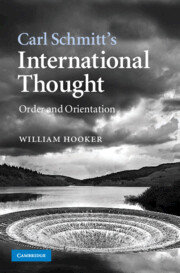Book contents
- Frontmatter
- Contents
- Preface
- Chronology of Schmitt's life
- 1 Introduction
- 2 Schmitt's ‘international thought’
- 3 Unravelling sovereignty
- 4 Histories of space
- 5 Acceleration and restraint
- 6 Großraum
- 7 Partisan
- 8 Conclusion
- Appendix. Carl Schmitt in international relations: a bibliographic essay
- Bibliography
- Index
- Frontmatter
- Contents
- Preface
- Chronology of Schmitt's life
- 1 Introduction
- 2 Schmitt's ‘international thought’
- 3 Unravelling sovereignty
- 4 Histories of space
- 5 Acceleration and restraint
- 6 Großraum
- 7 Partisan
- 8 Conclusion
- Appendix. Carl Schmitt in international relations: a bibliographic essay
- Bibliography
- Index
Summary
World order occupied Schmitt for his entire life. He posited order as an ideal, but also as an eternal problem in political life. Schmitt was always seized of the fact that all order is fragile, and his comfort in the murky zone between stasis and chaos contains an important lesson for all theorists of world politics. Indeed, the name Carl Schmitt has virtually become a byword for the hard-headed acceptance of the uncomfortable ‘facts’ of human existence. But in spite of his many sophisticated attempts to focus his attention on order and disorder as discrete and autonomous subjects of study, Schmitt ultimately failed to separate his study of order from his study of the history of the state. Faced with what he regarded as the collapse of the existing order, Schmitt actually turned away from a theoretical approach to the problem of order, and increasingly focussed on the historical experience of the state in a painful effort to explain its decline.
His consideration of the problem of world order shows Schmitt in all his variety as a thinker. Schmitt draws extravagantly from politics and philosophy, law and theology, history and geopolitics. It reflects both his ‘extreme talent’ and his ‘boundless vanity’. And whilst such an approach creates great richness, it also leaves behind a confused and fractious intellectual legacy, in which little agreement can be reached on ‘what Schmitt was really about’.
- Type
- Chapter
- Information
- Carl Schmitt's International ThoughtOrder and Orientation, pp. 195 - 202Publisher: Cambridge University PressPrint publication year: 2009



